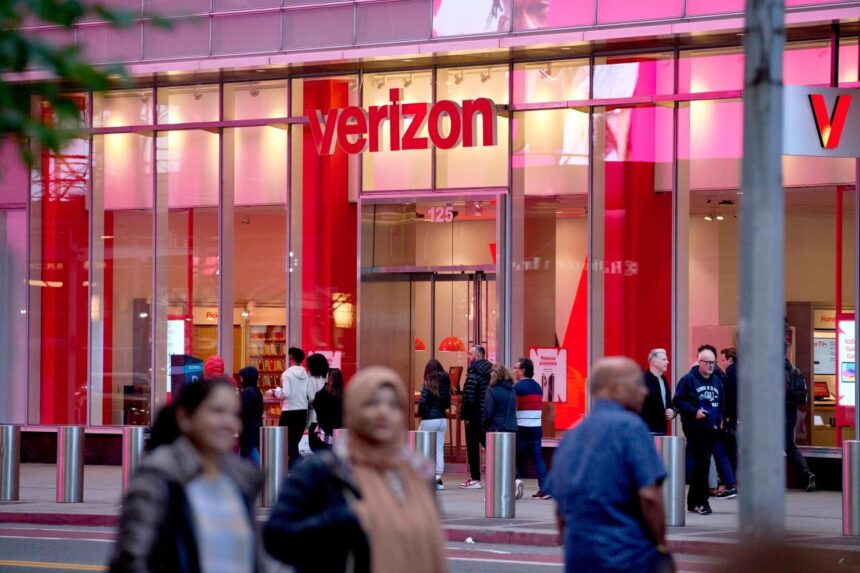(Bloomberg) — Verizon Communications Inc. reported third-quarter revenue that missed analyst expectations, weighed down by lackluster sales of hardware such as cell phones.
Most Read from Bloomberg
The company reported net revenue of 239,000 monthly phone subscribers, beating analysts’ projections of 222,000. But the total revenue is essentially flat from the previous year at $ 33.3 billion, slightly in the expectation of analysts of $ 33.4 billion, because the revenue of services and other growth is offset by the decline in the revenue of wireless equipment.
This was the second quarter in a row that lower equipment revenue outpaced other gains. The stock was down 4.1% Tuesday morning in New York.
“The decline in equipment sales is linked to a lack of new hardware features from smartphone manufacturers, which has led to lower changes and churn,” Bloomberg Intelligence analysts wrote in a recent note.
Telecom executives, including Verizon Chief Executive Officer Hans Vestberg, have said they do not expect Apple Inc.’s latest iPhone, which comes out in September, to spur a significant upgrade cycle. Apple’s iPhone 16 offers only modest hardware upgrades, and advanced artificial intelligence technology will only be gradually added to the device through additional software updates.
Vestberg said it’s still unclear whether the promise of AI capabilities in new iPhone models will convince people to upgrade. Historically, consumers have been persuaded to trade in devices by hardware redesigns or significant network evolutions such as 5G.
“Will the software side do it?” Vestberg asked about a video presentation to analysts on Tuesday. “It’s too early for us to say. So far, we haven’t seen it create a cycle.
Customers used to upgrade every 12 months, but now they keep their phones for more than 40 months, Vestberg said earlier.
As the pool of potential new wireless customers grows, New York-based Verizon has been offering customizable cellular and broadband plans and throwing in perks like savings on streaming services like Netflix and Max. The company is also pushing a fixed wireless product, which delivers high-speed internet over the airwaves rather than through a line to the home. Vestberg said this “convergence” of plans and products has been attractive to customers and leads to lower churn, or customers leave for competitors.
Verizon said it added 389,000 total broadband customers in the third quarter and increased its wireless customer base by 363,000 customers. That brings the total in fixed wireless to almost 4.2 million customers, reaching the company’s own target 15 months ahead of schedule. The company now expects eight million to nine million fixed wireless customers by 2028. Verizon had more than 11.9 million total broadband connections at the end of the third quarter.
Broadband efforts, along with the peer-to-peer push, are increasingly encroaching on the traditional cable company space. The three major telecommunications providers, including T-Mobile US Inc. and AT&T Inc., are expected to report that they added more than 900,000 broadband customers in the third quarter, including wireless home and fiber services, according to estimates compiled by Bloomberg.
Fixed wireless service requires more capacity than traditional wireless use, which has prompted Verizon to acquire extra spectrum licenses. Last week, Verizon agreed to buy some of US Cellular Corp’s spectrum licenses for $1 billion.
At the same time, the largest wireless company in the US has also spent heavily to expand its fiber optic network coverage. In September, Verizon agreed to pay $9.6 billion for Frontier Communications Parent Inc., adding 2.2 million fiber subscribers in 25 countries. The deal, valued at $20 billion, including Frontier’s net debt, is the largest for Verizon in more than a decade. Verizon expects more than 30 million over fiber by 2028 from the combination with Frontier, the company said in a statement.
The third quarter also saw some unexpected events, including major hurricanes in Florida and North Carolina that forced Verizon to work overtime to restore its network. There are other network disruptions that are not caused by natural disasters. AT&T and Verizon were named as victims of a China-related cyber attack called Salt Typhoon, which potentially exposed counterintelligence information, the Wall Street Journal reported. In late September, Verizon faced a temporary network outage that disrupted service for more than 100,000 people at its peak.
Verizon was the first of three US telecom companies to report earnings this week. AT&T and T-Mobile reported Monday. Verizon shares have gained about 16% this year, trailing a nearly 30% jump by AT&T and a 39% rise by T-Mobile.
Verizon reaffirmed its guidance for 2024, including adjusted EPS from $4.50 to $4.70. In the third quarter, adjusted earnings, at $1.19 per share, were slightly higher than the $1.18 per share average of analysts’ projections.
(Updates with open stock and fixed wireless customer targets.)
Most Read from Bloomberg Businessweek
© 2024 Bloomberg LP




